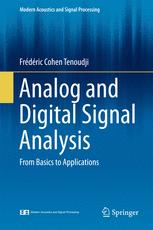

Most ebook files are in PDF format, so you can easily read them using various software such as Foxit Reader or directly on the Google Chrome browser.
Some ebook files are released by publishers in other formats such as .awz, .mobi, .epub, .fb2, etc. You may need to install specific software to read these formats on mobile/PC, such as Calibre.
Please read the tutorial at this link: https://ebookbell.com/faq
We offer FREE conversion to the popular formats you request; however, this may take some time. Therefore, right after payment, please email us, and we will try to provide the service as quickly as possible.
For some exceptional file formats or broken links (if any), please refrain from opening any disputes. Instead, email us first, and we will try to assist within a maximum of 6 hours.
EbookBell Team

4.3
78 reviewsThis book provides comprehensive, graduate-level treatment of analog and digital signal analysis suitable for course use and self-guided learning. This expert text guides the reader from the basics of signal theory through a range of application tools for use in acoustic analysis, geophysics, and data compression. Each concept is introduced and explained step by step, and the necessary mathematical formulae are integrated in an accessible and intuitive way. The first part of the book explores how analog systems and signals form the basics of signal analysis. This section covers Fourier series and integral transforms of analog signals, Laplace and Hilbert transforms, the main analog filter classes, and signal modulations. Part II covers digital signals, demonstrating their key advantages. It presents z and Fourier transforms, digital filtering, inverse filters, deconvolution, and parametric modeling for deterministic signals. Wavelet decomposition and reconstruction of non-stationary signals are also discussed. The third part of the book is devoted to random signals, including spectral estimation, parametric modeling, and Tikhonov regularization. It covers statistics of one and two random variables and the principles and methods of spectral analysis. Estimation of signal properties is discussed in the context of ergodicity conditions and parameter estimations, including the use of Wiener and Kalman filters. Two appendices cover the basics of integration in the complex plane and linear algebra. A third appendix presents a basic Matlab toolkit for computer signal analysis. This expert text provides both a solid theoretical understanding and tools for real-world applications.